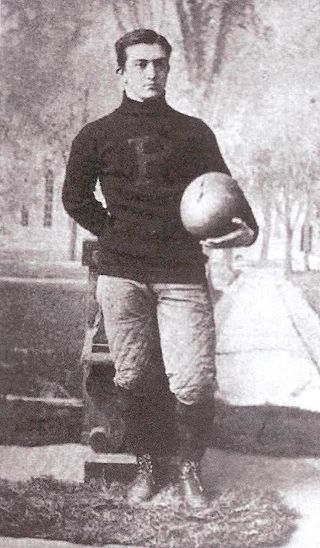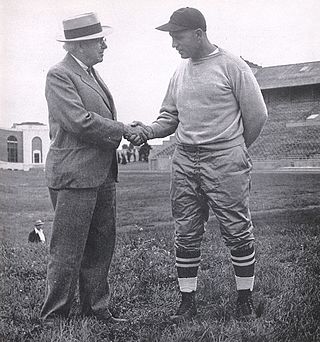
David Stewart was an attorney and politician from Baltimore, Maryland. A Democrat, he was most notable for his service in the Maryland Senate and his brief service as an interim U.S. Senator from 1849 to 1850.

John Prentiss Poe Jr. was an American college football player and coach, soldier, Marine, and soldier of fortune, whose exploits on the gridiron and the battlefield contributed to the lore and traditions of the Princeton Tigers football program.

Edgar Allan Poe was Attorney General of the State of Maryland from 1911 to 1915. He was born in Baltimore, the son of former Maryland Attorney General John Prentiss Poe. He was named for his great uncle and second cousin, twice removed, the celebrated author Edgar Allan Poe, who died in 1849.
Peter Hood Ballantine Cumming was an executive in several firms and served as Mayor of Rumson, New Jersey from 1950 to 1951.

Charles Sumner "Cy" Sherman was an American journalist and is known as the "father of the Cornhuskers" after giving the University of Nebraska football team the name "Cornhuskers" in 1899. At his suggestion in 1936, Associated Press (AP) sports editor Alan J. Gould created the first AP Poll for ranking college football teams. Sherman began his career writing at the Nebraska State Journal in Lincoln, spent a short time at the Red Lodge, Montana Pickett before returning to Lincoln and the Lincoln Star where he spent most of his career. At his death he was called by the Star the "Dean of American Sportswriters".

Thomas Dudley Riggs was an All-American football player. He played for Princeton University and was selected as an All-American in 1895.
William Barrett was a professional baseball player from 1871 to 1873. He was born in either Baltimore or Washington, D.C., and played parts of three seasons in the National Association of Professional Base Ball Players, including at least one game with each of the Fort Wayne Kekiongas (1871), Washington Olympics (1872), and Baltimore Canaries (1873). According to records of The Sporting News, he also played during the 1872 season for the Brooklyn Atlantics. According to Baseball-Reference.com, he made his debut on July 8, 1871, and was the 102nd person to compete in the National Association. He also played at least three games with the Pastime Club of Baltimore during the 1871 season. He played as a catcher, third baseman, shortstop, and outfielder. He recorded a single, a double, a run batted in, and scored a run in 13 major league at bats.
The 1901 Delaware football team represented Delaware College—now known as the University of Delaware–as an independent during the 1901 college football season. Led by Herbert Rice in his fifth and final year as head coach, Delaware compiled a record of 5–4.
The 1890 Princeton Tigers football team represented Princeton University in the 1890 college football season. The team finished with an 11–1–1 record. The Tigers recorded nine shutouts and outscored opponents by a combined total of 478 to 58. The team's only loss was by a 32–0 score against Yale and they tied the Orange Athletic Club 0–0.
The 1896 Virginia Orange and Bluefootball team represented the University of Virginia as an independent during the 1896 college football season. Led by first-year coach Martin V. Bergen, the team went 7–2–2 and claims a Southern championship. W. A. Martin played at end.
The 1901 Maryland Aggies football team was an American football team that represented Maryland Agricultural College as an independent during the 1901 college football season. In its first and only season under head coach Emmons Dunbar, the team compiled a 1–7 record and was outscored by at total of 129 to 49. The team's only victory came in a game against a team from a U.S. Marine Corps barracks in Washington, D. C.
The 1922 Maryland Aggies football team was an American football team that represented the University of Maryland in the Southern Conference (SoCon) during the 1922 college football season. In their 12th season under head coach Curley Byrd, the Aggies compiled a 4–5–1 record, finished in a five-way tie for 11th place in the conference, and were outscored by a total of 137 to 77.
Theodore Monroe McNair was a Presbyterian missionary and a college football and baseball player for the Princeton Tigers as a halfback and center fielder in the 19th century. He played at the halfback position. He was one of the stars of football's early years of collegiate play.
The 1895 Rutgers Queensmen football team represented Rutgers University as an independent during the 1895 college football season. In their first and only season under head coach H. W. Ambruster, the Queensmen compiled a 3–4 record and were outscored by their opponents, 131 to 98. The team captain was William A. Ranney.
The 1892 Rutgers Queensmen football team represented Rutgers University as an independent during the 1892 college football season. The Queensmen compiled a 3–5–1 record and were outscored by their opponents, 160 to 108. The team had no coach, and its captain was John C. Loud.
Josephine Antoinette Ward was born in 1820 at Sing Sing, Westchester County, New York. She was the eldest child of Aaron Ward and Mary Watson Ward.
Edmund Kelly was the first African-American Baptist minister ordained in Tennessee. He escaped slavery in the 1840s to New England and returned after the US Civil War. He worked as a preacher and teacher in Columbia, Tennessee and was a frequent participant in national Baptist Conventions.
John Hudson Riddick was an educator, community leader, and minister in the African Methodist Episcopal (AME) church. In 1872 he was elected a member of the Norfolk, Virginia, city council. He was an AME minister at a number of churches and a leader in the Washington and Delaware Conferences of the church.
The 1901 Lehigh Brown and White football team was an American football team that represented Lehigh University as an independent during the 1901 college football season. In its first and only season under head coach J. W. H. Pollard, the team compiled a 1–11 record and was outscored by a total of 278 to 26.

The 1904 Dickinson football team was an American football team that represented Dickinson College as an independent during the 1904 college football season. The team compiled an 8–3–1 record and outscored opponents by a total of 219 to 53. Professor Forrest Craver was chosen as the team's head football coach; he had been the captain of Dickinson's 1897 team.







